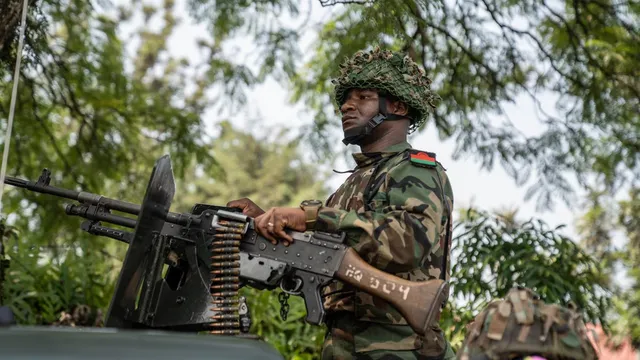
African nations withdraw troops after peacekeeper deaths in eastern Congo
2025-03-13 14:50- African leaders decided to withdraw thousands of troops deployed to eastern Congo due to rising public outcry following peacekeeper casualties.
- The decision was made during a virtual meeting of the Southern African Development Community, facing ongoing violence from M23 rebels.
- The situation in eastern Congo remains precarious, highlighting the urgent need for dialogue and effective conflict resolution strategies.
Express your sentiment!
Insights
In a significant move, African leaders announced the withdrawal of troops from South Africa, Tanzania, and Malawi stationed in eastern Congo. This decision comes amid rising public opposition to their presence in the region, especially after the deaths of 14 South African and 3 Malawian peacekeepers at the hands of M23 rebels in January. M23 has gained control of major cities, including Goma and Bukavu, further escalating the conflict that has plagued this mineral-rich area. Although there was no stipulated timeline for the withdrawal, the Southern African Development Community indicated it would take place in phases. While the mission was initially framed under the Southern African Development Community's mandate, the changing dynamics of the conflict compelled African leaders to reassess their strategy. The M23 group, supported by around 4,000 troops from Rwanda, has consistently threatened to advance toward Kinshasa, which exacerbates the humanitarian crisis affecting over 7 million displaced people in the region. The South African Foreign Minister Ronald Lamola has called for all non-invited parties in the conflict to also withdraw to ensure a secure ceasefire and facilitate peace negotiations. This decision to withdraw underscores the challenges faced by international peacekeeping efforts in complex conflict zones like eastern Congo. With various armed groups, including Congolese soldiers, foreign mercenaries, and the UN peacekeeping forces, all involved and often at odds, the situation remains volatile. Moreover, the United Nations Human Rights Council has begun investigating the recent atrocities in the region, including mass killings and allegations of ethnic cleansing. As dialogue initiatives are poised to take place in Angola, the continued presence of various armed factions presents significant obstacles to achieving lasting peace. In conclusion, as troop withdrawals commence, the situation in eastern Congo remains critical. The brutality of the conflict and especially the loss of life among peacekeepers have prompted urgent calls for a comprehensive strategy that emphasizes dialogue, withdrawal of non-state actors, and robust international support to ensure that peace efforts have a tangible chance at success.
Contexts
The current situation in eastern Congo is marked by ongoing violence, humanitarian crises, and the complex interplay of local, regional, and international factors. The region has long been plagued by conflict, primarily driven by a mix of ethnic tensions, struggles over resources, and the spillover effects of wars in neighboring countries. Despite various peace agreements and the presence of international peacekeeping forces, violence continues to erupt, particularly from armed groups such as the Allied Democratic Forces (ADF) and various militia factions that engage in brutal attacks against civilians. This environment has created a persistent state of insecurity, leading to significant displacement of populations and hindering efforts for economic development and stability in the region. As of March 2025, the humanitarian situation in eastern Congo remains dire, with millions of people in need of assistance. Internal displacement has reached alarming levels, with an estimated 5.5 million individuals forcibly uprooted from their homes. Access to basic services, including healthcare, education, and clean water, is severely limited, exacerbating the challenges faced by vulnerable populations, especially women and children. The ongoing violence and instability not only impede humanitarian efforts but also perpetuate a cycle of poverty and desperation among the affected communities. International organizations, including the United Nations, are working to address these challenges, but their efforts are often hampered by the prevailing insecurity and logistical difficulties in reaching those in need. Efforts to restore peace in eastern Congo are complicated by the involvement of various stakeholders, including local communities, national authorities, and international actors. While some local leaders and groups are actively participating in peacebuilding initiatives, achieving a comprehensive and lasting resolution to the conflict is a complex task. Regional dynamics also play a crucial role in the situation, as neighboring countries sometimes contribute to instability through cross-border militias and support for certain factions. This interplay of external and internal factors necessitates a coordinated response from both regional partners and the international community to address the root causes of violence and foster sustainable peace. Moving forward, it is essential for the Congolese government, supported by international partners, to prioritize dialogue and reconciliation efforts among conflicting parties, while ensuring the protection of civilians and humanitarian workers. Sustainable development initiatives must also be integrated into these peacebuilding efforts to provide economic opportunities and social services to affected populations. Ultimately, the path to enduring peace in eastern Congo requires a comprehensive approach that goes beyond military solutions and acknowledges the intricate web of political, social, and economic issues that underpin the ongoing conflict.